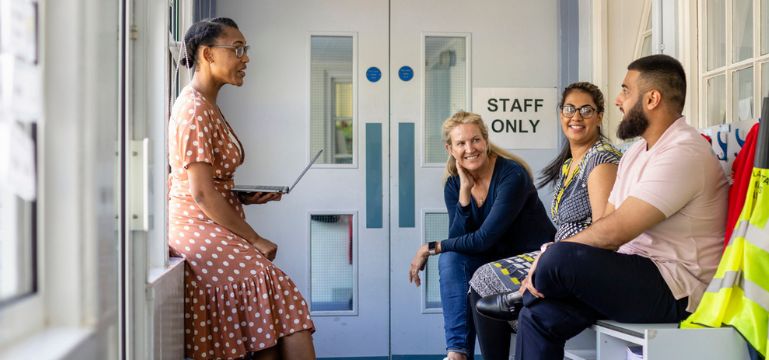Developing leadership at all levels to improve the quality of provision, pupil progress and well-being and to ensure resilience of leadership in the future

Quick links:
Information about the school
Ysgol Gynradd Dolau Primary School is a bilingual school in the village of Llanharan, in Rhondda Cynon Taf. Currently, 525 pupils between the age of 3 and 11 years attend the school. This figure includes 65 pupils who attend the nursery part-time. Approximately 6.3% of pupils are eligible for free school meals, which is below the national average. There are 19 classes. The school provides education through the medium of Welsh and English, and pupils from both departments integrate on a regular basis. Very few pupils come from an ethnic minority background. The school identifies 1.8% of pupils as having additional learning needs.
Context and background to the effective or innovative practice
Leadership has been identified as a strength in the last three inspections (2012, 2015 & 2023) and Dolau features as a case study in an Estyn thematic report “Leadership and Primary School Improvement” (2016), looking at how tiered leadership and succession planning enables the school to sustain good performance.
Dolau has continued to refine and evolve the leadership structure at all levels. A distributed leadership approach is fully supported by a strong professional learning culture. Investment in leadership and professional learning allows the school to be proactive and develop the ability to adapt effectively to the wider reform of education in Wales.
The school is proud of its reputation for developing future leaders, as demonstrated by the five current headteachers and four deputy headteachers who have been developed through the school’s tiered approach to leadership and succession planning.
Description of nature of strategy or activity
Developing Leadership Skills
The development of leadership and building capacity in the school centres around high expectations and a clear vision for all stakeholders, identifying leaders at the earliest stage in their journey. These include classroom practitioners, support staff, curriculum specific and whole-school initiative leaders and senior management.
Succession planning identifies leaders at all levels and prepares them for future promotions and vacancies within the system. Once identified, staff are nurtured and the appropriate leadership pathways form part of their development along with the opportunity to learn from senior experienced leaders.
Creating the Conditions
The headteacher, along with the deputy headteacher, has established a culture where professional learning is valued. Within this system, autonomy, innovation, and risk taking are encouraged at all levels. Leaders encourage staff to plan, evaluate and review their areas of expertise and leadership. Senior leaders act as role models and provide support to staff via a system of coaching and mentoring. In this way, new leaders feel valued and they very quickly gain confidence in their leadership capacity, creating a desire to succeed.
Culture of professional learning
The performance management structure facilitates professional learning and the early identification of potential leaders.
A blended approach to professional learning includes the development of research informed practice, which is closely linked to pedagogy and school improvement priorities. Teachers conduct their own research enquiries, implement strategies and share their findings. Continual opportunities for professional dialogue encourage collaboration and a shared understanding of good practice. This in turn promotes a supportive culture for innovation. Support staff follow very similar processes to teachers and contribute effectively to staff training in their areas of expertise.
Collaboration with other institutions, such as higher education and initial teacher education providers, has a direct impact on the quality of professional learning and the development of leadership skills in the school. The school identifies leadership pathways for individual staff who then follow a carefully designed programme to develop and prepare them for future leadership.
What impact has this work had on provision and learners’ standards?
Effective professional leaning supports shared research by the staff. This impact positively on outcomes for learners. For example, staff research led to the development of a whole-school metacognition toolkit, which has led to greater consistency in pedagogy across the school. As a result, pupils now have developed a deeper understanding of how they learn and are quickly developing as independent learners.
How have you shared your good practice?
- 2016 Estyn publication, Leadership and primary school improvement
- Estyn case study review of support for Welsh in Initial teacher training 2023
- Good practice shared within school – research presentations (professional dialogue)
- Collaboration with regional consortia – Digital, RSE, Welsh, Curriculum, ALN ,SLO Champion
- Collaboration with HEIs – Research Champion, Research Conference & NPEP